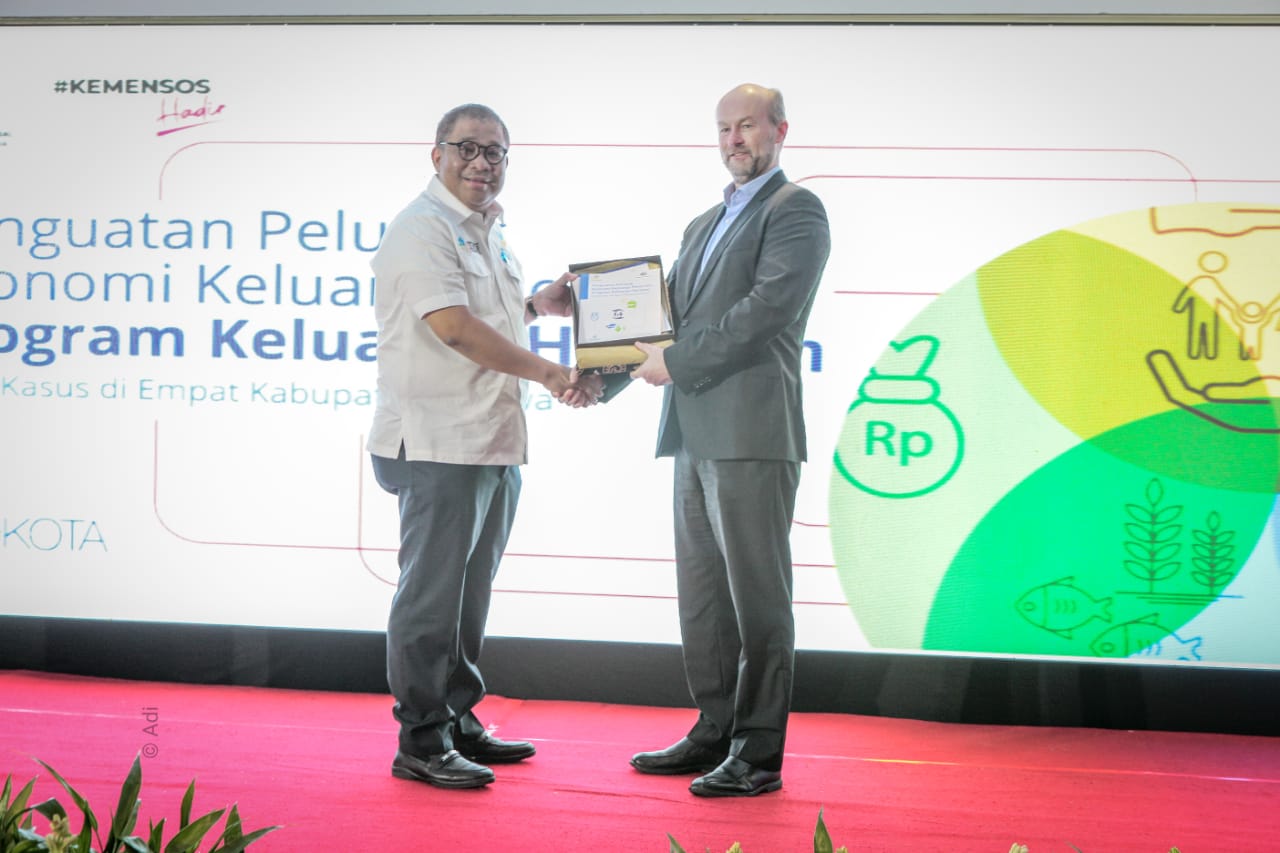Ministry of Social Affairs Launches Research on Opportunities to Strengthen the Economy of KPM PKH

JAKARTA (February 12, 2020) - Minister of Social Affairs Juliari P. Batubara represented by Secretary General Hartono Laras launched the results of a research entitled Strengthening Economic Opportunities for Families Receiving the Family Hope Program (PKH)" at the Borobudur Hotel, Central Jakarta, Wednesday. The research was conducted by the Ministry of Social Affairs in collaboration with the Australian Government through the Towards a Strong and Prosperous Indonesian Society (MAHKOTA) Program and the SMERU Research Institute.
"The main findings of the study include that 60 percent of PKH family members of working age have a primary education level or even lower. Those who reach junior high school or higher are usually 15-30 years old, only 20 percent of whom are part of the labor force," Hartono said.
Furthermore, he continued, 36 percent of respondents are farmers with minimal capital, simple tools, and limited access to land and water. Meanwhile, 18 percent of respondents have MSME businesses with higher income than farmers but do not have business licenses, do not have business competency standards, and only have small capital, and 58 percent work as formal or informal employees in small companies, but do not have sufficient knowledge of employment opportunities and work without contracts.
"Another finding is that the majority of PKH beneficiary members experience limitations in accessing skills training, job placement services, and local capital grant schemes. Most find P2K2 useful as it teaches them to save and manage household finances, but are faced with a lack of capital to start a business," Hartono continued.
Hartono said this study is relevant in order to improve the integration of the PKH program with other empowerment programs to support the economic improvement of KPM. For example, capital assistance for micro-enterprises, connecting KPM with markets and/or jobs, and capacity building to strengthen skills and knowledge in livelihood acquisition so as to enable working-age members in poor and vulnerable households to get jobs and increase income.
"Thus, this study is in line with the Ministry of Social Affairs' policy to focus on empowerment schemes as well as linking with other funding mechanisms, such as UMI, KUR, and so on", Hartono said.
PKH was launched by the Government of Indonesia in 2007 to reduce intergenerational poverty. Until now PKH has reached 10 million KPM. Several improvements have been made such as program management, distributing assistance with non-cash payments, and adding components to family development sessions or better known as Family Capacity Building Meetings (P2K2) to increase family knowledge related to health and nutrition, education, child protection social welfare and economic improvement.
"In order to accelerate poverty reduction as targeted in the 2020-2024 RPJMN, which is down to 6-7% by the end of 2024, better collaboration between ministries/institutions is needed in planning and implementing sustainable livelihood programs for PKH beneficiaries in Indonesia," Hartono said.
Meanwhile, Australian Chargé d'Affaires to Indonesia, Allaster Cox in his remarks said that the Australian Government hopes to continue its ongoing partnership with the Indonesian government to enhance inclusive economic development.
The Indonesian Government and Ministry of Social Affairs' focus on improving the livelihoods of poor households through greater economic inclusion is in line with the priorities of Australia's development partnership with Indonesia, he said.
The launch event was followed by a presentation of the study results to experts and policymakers related to the implementation of PKH which presented speakers SMERU Director Widjajanti Isdijoso and MAHKOTA Social and Labor Protection Specialist Karishma A. Huda, as well as several panelists consisting of Deputy for the Coordination of Poverty Reduction and Social Protection of the Coordinating Ministry for Human Development and Culture (PMK) Tubagus A. Choesni, Director General of Social Protection and Security of the Ministry of Social Affairs Harry Hikmat, and Director of Prosperous Village Enterprises Muhammad Najib.
Attending the event were Echelon I and II Officials of the Ministry of Social Affairs, Coordinating Ministry for Economic Affairs, Bappenas, Ministry of Finance, Ministry of Cooperatives and SMEs; BPS; Presidential Staff Office (KSP); Australian Government Representative and DFAT Program; World Bank-Indonesia; ADB-Indonesia; Islamic Development Bank-Indonesia; TNP2K Secretariat; Research Institutions and Practitioners; and MAHKOTA.
Public Relations Bureau
Ministry of Social Affairs RI
 English
English
 Bahasa
Bahasa
